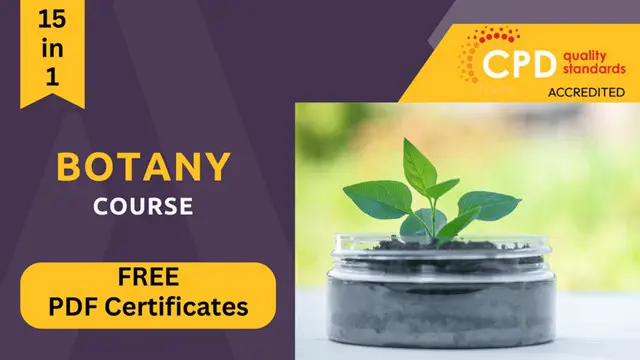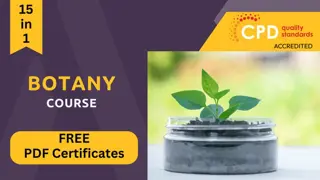
Botany - CPD Certified Training
Spring Blooming Sale : Up to 98% Off | 15 in 1 Exclusive Bundle |PDF Certificate, Transcript, Student ID & Test Included
StudyHub
Summary
- CPDQS Digital Certificate & Transcript Included for The Title Course Only - Free
- CPD Certified Printed Hardcopy Certificate (Per Unit) - £8
- Exam(s) / assessment(s) is included in price
- Tutor is available to students
Add to basket or enquire
Overview
24 Hour Flash Deal **15-in-1 Botany Mega Bundle**
►►► Enrolment Gifts ◄◄◄ **FREE PDF Certificate**FREE PDF Transcript ** FREE Exam** FREE Student ID ** Lifetime Access **FREE Enrolment Letter **
Take the initial steps toward a successful long-term career by studying the Botany package online with Studyhub through our online learning platform. By finishing this Botany Bundle, you'll have depth understanding and employable abilities. A certificate is also included, which can improve your resume and make you more marketable. The Botany Bundle is a great way to develop your career, in conclusion. What are you searching for then? Enrol immediately in this Botany Bundle and start learning every piece of information related to Botany!
Why Choose Our Course?
- Step-by-step lessons in this Botany bundle
- One-to-one assistance from professionals if you need it
- Innovative exams to test your knowledge after the Botany course
- 24/7 customer support available for this Botany course
- Unlimited lifetime access to this Botany bundle
This Botany Bundle consists of the following career-oriented courses:
- Course 01: Botany
- Course 02: Reproduction in Flowering Plants
- Course 03: Horticulture & Organic Gardening
- Course 04: Forestry
- Course 05: Agricultural Science
- Course 06: Environmental Law
- Course 07: Biotechnology
- Course 08: Floristry Academy Diploma
- Course 09: Kitchen Gardening
- Course 10: Mushroom Growing Course
- Course 11: Basic Biology
- Course 12: Homesteading Diploma
- Course 13: Arboriculture
- Course 14: Land Management
- Course 15: Genetics
The Botany Bundle has been prepared by focusing largely on career readiness.
CPD
Course media
Description
This Botany Bundle resources were created with the help of industry experts, and all subject-related information is kept updated on a regular basis to avoid learners from falling behind on the latest developments.
Course Curriculum
**Botany**
Module 01: Introduction to Biology
- The Human Population and Plants
- Definition of Botany
- Scope of Botany
- Characteristics of Plants
- Biological Diversity
- Hierarchy
- Summary
Module 02: Morphology of Plants
- Definition of Plant Morphology
- The Plant Body
- Morphology of Leaf
- Leaf Form and Structure
- External Structure of Leaves
- Internal Structure of Foliage Leaves
- Other Leaf Types
- Leaves of Conifers
- The Root System
- External Structure of Roots
- Internal Structure of Roots
- Other Types of Roots
- Morphology of Stem
- Summary
Module 03: Cell Biology and Anatomy of Plants
- Introduction to Cell Biology
- Definition of Cell
- Cell Shape and Size
- Structure of Plant Cell
- Cell Organelles
- Plant Tissue
- Meristematic Tissue
- Permanent Tissue
- Simple tissue
- Parenchyma
- Collenchyma
- Sclerenchyma
- Complex Tissue
- Xylem
- Phloem
- Secretory Tissues
- Tissue System
- Epidermal Tissue System
- Ground Tissue System
- The Vascular Tissue System
- Anatomy of Stem
- Anatomy of Root
- Anatomy of Leaves
- Summary
Module 04: Naming Plants and Taxonomic Classifications
- Basic Components of Taxonomy
- Objectives, Goals and Aims of Plant Systematics
- Future of Plant Taxonomy
- What Is Classification?
- Ranks of Plant Classification
- Types of Systems of Classification
- Concept of Taxa
- Concept of Species
- Concept of Genus
- Concept of Family
- Taxa Above Family Level
- Fundamentals of Plant Nomenclature
- Who is a Nomenclaturist?
- Common Names and Scientific Names
- What is Binomial Nomenclature?
- What is ICBN?
- Principles of ICBN
- Chemotaxonomy
- Molecular Taxonomy
- Serotaxonomy
- Summary
Module 05: Plant Physiology
- Introduction to Plant Physiology
- Imbibition
- Diffusion
- Osmosis
- Absorption
- Absorption of Water by Plant
- Factor Affecting Absorption of Water
- Transpiration
- Factors Affecting Transpiration
- Enzymology
- Respiration
- Mechanism of Respiration
- Krebs Cycle
- Factor Affecting Respiration
- Photosynthesis
- Photosynthetic Pigments
- Mechanism of Photosynthesis
- Calvin Cycle
- Factors Affecting Photosynthesis
- Summary
Module 06: Embryology of Plants
- Introduction to Embryology of Plants
- Pollen Grain
- Pollination
- Types of Pollination
- Modes of Cross-pollination
- Germination of Pollen
- Formation of Female Gametophyte
- Fertilisation
- Double Fertilisation
- The Fruit
- Structure of Fruit
- Types of Fruits
- The Seed
- Structure of Seeds
- Types of Seeds
- Dispersal of Seeds and Fruits
- Dispersal by Wind
- Dispersal by Water
- Dispersal by Animals
- Summary
Module 07: Plant Genetics and Evolution
- The Fundamentals of Plant Genetics
- Replication of DNA
- Mutations
- Causes of Mutations
- Effects of Mutations
- DNA Repair Processes
- Crossing-Over
- Linkage
- Concepts of Evolution
- Population Genetics
- Natural Selection
- Rates of Evolution
- Phyletic Speciation
- Pollen Transfer
- Seed Dispersal
- Summary
Module 08: Plant Ecology
- What Is Ecology?
- Ecological Classification of Plants
- Mode of Nutrition
- Autotrophic plants
- Heterotrophic Plants
- Symbiotic Relationships
- Symbiosis and Mutualism
- Commensalism
- Amensalism
- Parasitism
- Competition
- Predation
- Mycorrhiza
- Population and Community Ecology
- Natality
- Mortality and Survivorship
- Ecosystem
- Structure of the Ecosystem
- Food Chain and Food Web
- Ecological Pyramid
- Pyramid of Number
- Pyramid of Biomass
- Summary
Module 09: Cryptograms and Microbes
- Virus
- Characteristics of Virus
- Classification of Viruses
- Structure of Viruses
- Plant Viruses
- Control of Plant Viral Diseases
- Bacteria
- Characteristics of Bacteria
- Structure of Bacteria
- Mode of Nutrition
- Reproduction
- Economic Impotence
- Cyanobacteria
- Algae
- Classification of Algae
- Reproduction
- Economic Importance of Algae
- Fungi
- Characteristics of Fungi
- Reproduction
- Classification of Fungi
- Economics Importance of Fungi
- Lichens
- Structure and Form
- Economic Importance of Lichens
- Bryophytes
- Characteristics of Bryophytes
- Classification of Bryophytes
- Summary
Module 10: The Gymnosperms
- Introduction to Gymnosperms
- Classification of Gymnosperms
- Cycas
- Morphology and Anatomy
- Reproduction and Lifecycle
- Economic Importance
- Pinus
- Morphology and Anatomy
- Economic Importance
- Ephedra
- Habit
- Anatomy
- Summary
Module 11: Angiosperms - The Flowering Plants
- Introduction to the Angiosperm Kingdom
- Classification of Angiosperms
- Monocots
- Eudicots
- The Life Cycle of Angiosperms
- Adaptation of Flowering Plants
- The Evolution of Flowering Plants
- Flowering Plant Families
- Magnolia Family
- Walnut Family
- Cactus Family
- Mustard Family
- Rose Family
- Pea Family
- Potato Family
- Pumpkin Family
- Sunflower Family
- Grass Family
- Orchid Family
- Economic Importance of Angiosperms
- Summary
Module 12: Palaeobotany
- PalaeoAn Introduction
- Fossilisation
- Factors Influencing Fossils Formation
- Types of Fossils
- Petrifactions
- Incrustation
- Compression
- Compactions
- Impression or Imprint
- Calcification
- Diatomaceous Deposits
- Fossil Record and Fossil Plants
- Pteridophytes
- Gymnosperms
- Geologic Time Scale
**Reproduction in Flowering Plants**
Section 01: SEXUAL REPRODUCTION IN ANGIOSPERMS - PART I
- Structure of a Flower
- Structure of Male Part of Flower
- Microsporogenesis
- Structure of Female Part of Flower
- Megasporogenesis
Who is this course for?
This course is suitable for —
- Students
- Recent graduates
- Job Seekers
Requirements
There is no formal qualification needed for this Botany course
Career path
You will be able to achieve a lucrative career because this Botany Bundle includes various courses as a bonus.
Questions and answers
Currently there are no Q&As for this course. Be the first to ask a question.
Certificates
CPDQS Digital Certificate & Transcript Included for The Title Course Only
Digital certificate - Included
After studying the course materials, you will be able to take the MCQ test that will assess your knowledge. After successfully passing the test you will be able to claim One Digital Certificate & Transcript for the title course completely free of cost. The cost for additional digital certificates is £4.99 each.
CPD Certified Printed Hardcopy Certificate (Per Unit)
Hard copy certificate - £8
- FREE UK Delivery
- International Delivery +£ 10.00
The price for each Printed Hardcopy Transcript is £9.99.
- FREE UK Delivery
- International Delivery +£ 10.00
Student ID Card is included in the price, excluding shipping fees.
- UK Delivery £4
- International Standard +£ 8.00
Reviews
Currently there are no reviews for this course. Be the first to leave a review.
Legal information
This course is advertised on reed.co.uk by the Course Provider, whose terms and conditions apply. Purchases are made directly from the Course Provider, and as such, content and materials are supplied by the Course Provider directly. Reed is acting as agent and not reseller in relation to this course. Reed's only responsibility is to facilitate your payment for the course. It is your responsibility to review and agree to the Course Provider's terms and conditions and satisfy yourself as to the suitability of the course you intend to purchase. Reed will not have any responsibility for the content of the course and/or associated materials.






